William (Iam) Tongi sings a few soulful notes over the phone. The 2023 American Idol winner who charmed audiences with his warm vocals and unassuming demeanor slips into the melody as naturally as ocean waves washing over the beaches in Kahuku, Hawaii, where he was born. Throughout the competition, the 18-year-old singer often represented the Pacific Islands where he grew up through his style of music. The song he sings now carries that same feeling of home—but the topic is completely different.
“I heard Him come, I saw His very face,” he sings. We are about 30 minutes into our interview, and if I were speaking with anyone else, the song would have likely been a little bit out of the ordinary. But with Iam, it feels right; the notes seem as effortless as breathing. After asking me if I know the song (I don’t), he continues with the chorus:
“Nations fall behind Him
The rivers crawl to find Him
Mountains move just to let Him through.”
Since then, I’ve looked up the song “I Heard Him Come,” per Iam’s recommendation. The lyrics, which go on to testify of the Savior’s ability to heal people and even raise them from the dead, were written by Latter-day Saint Jeff Goodrich in 1974 for a seminary assignment. At the time, Jeff was just a teenager—and decades later, the song has special meaning to Iam, who is now in his teens. When he sings those words, he can hear his dad, who passed away in December 2021 due to stage 4 kidney disease, singing along with him.
“A lot of times when I’m really nervous [before performing], I’ll go in a room [and] sit in the corner and play that song and hear my dad singing with me, just so I remember what he sounded like. I know I have videos of me and my dad singing, but it’s not the same. It doesn’t feel the same and it doesn’t sound the same. But when I sing those songs, it’s almost like he’s with me. I don’t know how to explain it,” he says, noting that he has the same experience when he sings a Tongan gospel song.
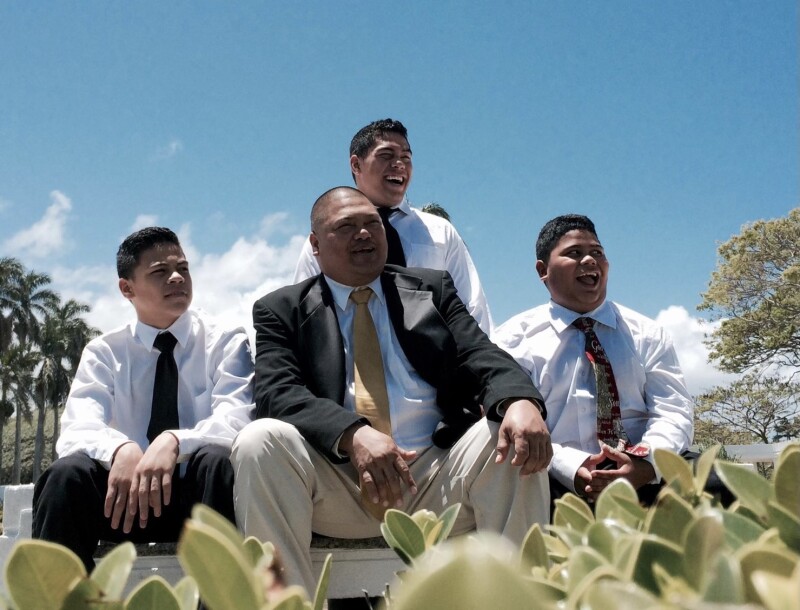
Rodney Tongi has been part of Iam’s music journey from the beginning. By supporting him, teaching him vocal skills, and singing alongside him, he helped Iam succeed—so it feels appropriate that their connection would continue beyond the veil through their mutual love of music. But it isn’t just music that unites father and son: it’s the covenant blessing of eternal families.
Iam has a strong testimony that families are eternal and that he and his dad will be together forever. And that testimony, as well as his faith in Jesus Christ, has continued to grow. It has helped pull him through the dark times in his life and anchored him in doing what’s right—and it is the person he’s become through that journey who equally deserves the spotlight.
A Gift
Iam says he was a singer from the start. “I always sang everywhere I went—even in the shower, or when I’d just sit there doing nothing, I’d sing. And I finally learned how to play ukulele in fifth grade, and I was really happy,” he says.
He credits his start in music to Alison Faleolo, his fifth-grade teacher, who incorporated ukulele lessons into her teaching to help her students learn a new skill and connect them to Hawaiian culture. Alison recalls how, like all students, Iam faced a learning curve at the beginning of his music journey.
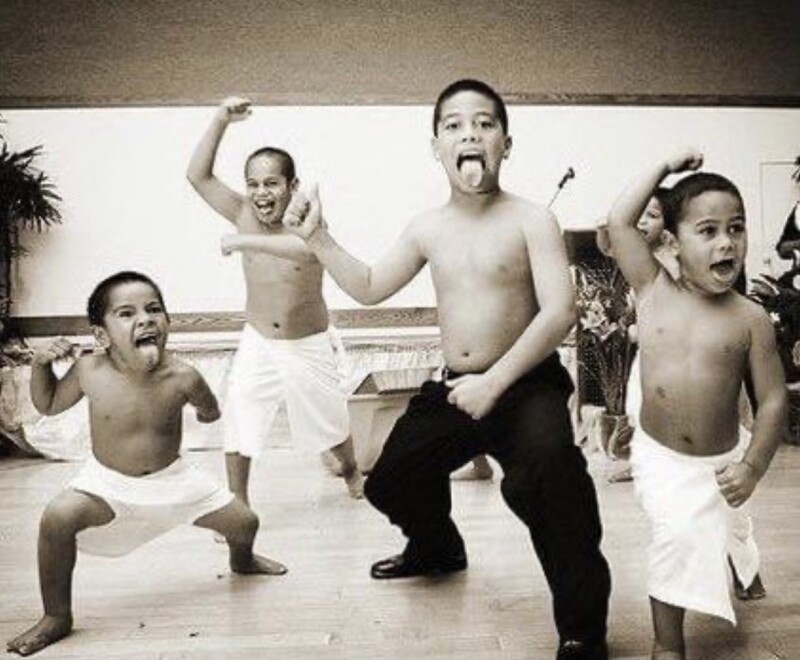
“William was not different from any of the other students. There was whining and crying about sore fingers and trying to learn notes,” she says—but then, one day, everything changed. “I just remember him coming back to school and telling us, ‘My uncles have a ukulele and I played it, and nobody could believe I could play the ukulele.’ Just the fact that his parents were excited for him I think really boosted his desire to learn to play.”
In fact, Iam was so excited about the ukulele that it became a helpful motivator. He often struggled to focus in school due to attention-deficit/hyperactivity disorder (ADHD), so an arrangement was made that if he finished his schoolwork, he could borrow a ukulele for the weekend. He even started looking forward to going to school as he learned more about the instrument, and Alison says his confidence grew as he excelled and started learning songs on his own.
“He literally would come to school, especially after he got his own ukulele for Christmas, . . . [and] after every weekend, he’d be like, ‘I was online, and I was watching how to play a song, . . . Can I play it for you?’” Alison recalls. “And it was just wonderful. It [could] have been a local song, it could have been a popular song on the radio or even a church song. You just knew he enjoyed what he was doing by the second half of the year.”
His ukulele had been a gift from his dad, who believed in Iam’s talent from the start. Iam’s mother, Lillie Tongi, remembers the instrument had cost about $300, which she says was too much for their budget at the time. But Rodney was willing to invest, and later he even used his holiday pay to buy Iam a quality guitar.

“I was like, ‘Not right now, Rodney, we don’t have that kind of money,’” Lillie says. But she remembers Rodney telling her, “This is investing in Iam’s future. If you want him to feel that he’s worth something, you have to get him something that’s worth something.” And he was right—Lillie still remembers the excitement in Iam’s eyes when he got that guitar and how he played it for days afterward.
A Natural Performer
As he grew into his talent, Iam loved sharing music in all kinds of situations. His uncle William Tuifua, whom Iam was named after, says his nephew would often play at family gatherings and take songs by request.
“Sometimes you’d feel bad for him because he’d been singing for a while, but he’d continue to sing. So sometimes, we’d stop the family members from asking [him] to sing to give him a break so he could go play, ’cause he was still a kid,” William says.
Iam didn’t just play for family—often, when he was hanging out with friends at a park or someone’s house, Lillie says, her son had his guitar with him and he would jam with them just for fun. In eighth grade, he also started performing on weekends at a Hawaiian food truck called Mike’s Huli Chicken, where he was paid in tips and free food. The more people heard him play, the more word started to spread—so before long, people were asking Iam to perform at events like graduations and weddings.
Lillie remembers how one woman who invited Iam to play for an event predicted that “one day, we will hear Iam on the radio.” Years later, Lillie reminded the woman of that memory. She recalls her saying, “I know. I knew already just from hearing him perform that it would only be [a matter of] time [before] he’ll be out there.”
Iam also dabbled with songwriting and started making up funny songs that his family could sing along to. But gradually he refined his craft, and by age 15 he wrote a song for his sister’s wedding called “Dreams” that shows just how far the young musician had come: his soothing instrumentals had nuance and his lyrics showed emotional depth. That song that was written for a newlywed couple during the COVID-19 pandemic now has over 100,000 views on YouTube and has many comments from listeners impressed that one so young could write music so well.
But it was a long road to success; Iam said on American Idol that a few years prior he and his family had been “priced out of paradise,” forcing them to leave their home in Hawaii and move to Seattle, Washington, in 2019. Rodney had also been struggling with health issues when they moved and would ultimately be on dialysis for a year and a half. But Iam kept on playing, and since his mom worked for an airline, he could travel for free and perform at events in Washington, Utah, Hawaii, and California that were mainly held in the Polynesian community. And though Iam usually played without pay, the experience of performing in front of larger crowds undoubtedly helped prepare him for American Idol.
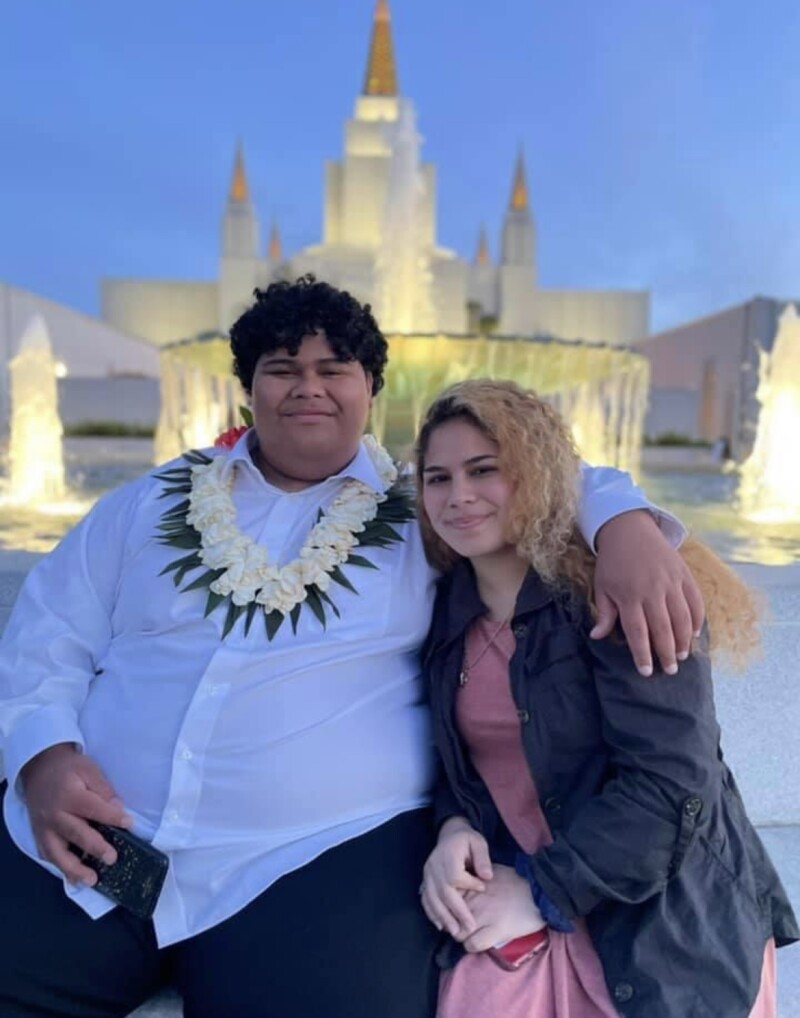
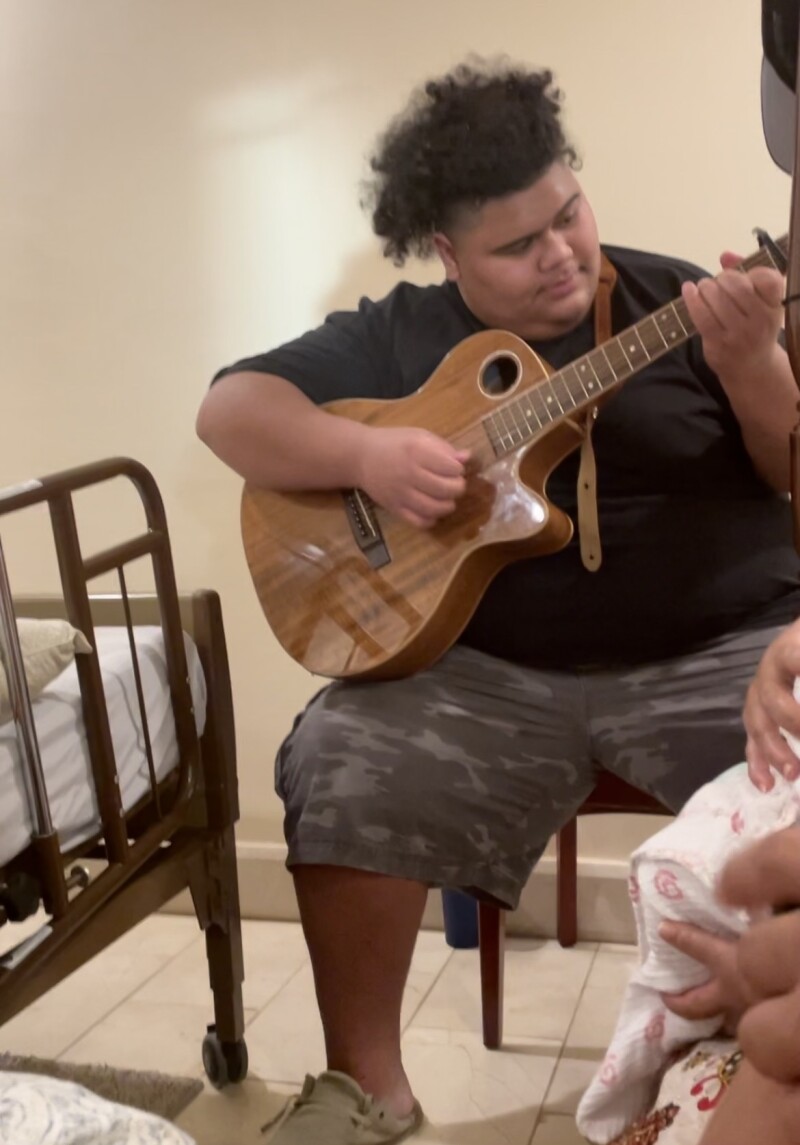
More importantly, Iam also played for people when they needed it most. For instance, after his family moved to Washington, he flew back to Hawaii to play at his aunt’s bedside before she passed away from cancer. Music also gave him cherished memories with his dad, who loved country and reggae. Iam was inspired by those influences as well and says singing together was one of the best ways they related to each other—while their relationship wasn’t always perfect, music was a natural way for them to connect.
Rodney and Iam’s special connection continued when Rodney was on dialysis, and they sang a number at a funeral less than a month before Rodney’s death on December 28, 2021. Lillie says she’s listened to a recording of Rodney and Iam singing that song about 100 times since—and though her husband passed away at a young age, she’s grateful for the extra time she believes God gave him to be with their family.
But when Rodney died, it felt like the music had left with him—and it would be some time before the Tongis felt they could bring that music back into their lives once more.
Finding His Voice
Iam and Lillie helped each other work through their grief when Rodney passed away. Lillie says she fell into what was likely depression and had little desire to participate in prayer and scripture reading, which felt empty without her husband. But Iam gently encouraged her to try.
“He would always walk in and [say], ‘Mom, can we say—in Tongan, it’s lotu—a prayer?’ And then I’ll be like, ‘OK, you say a prayer,’” she remembers. Iam would also ask if he could share a favorite scripture—a tradition his dad had always encouraged at home—and his mom would tell him to go ahead. “People say I’m his rock,” Lillie continues, “but I feel like he has been my rock in a lot of situations.”
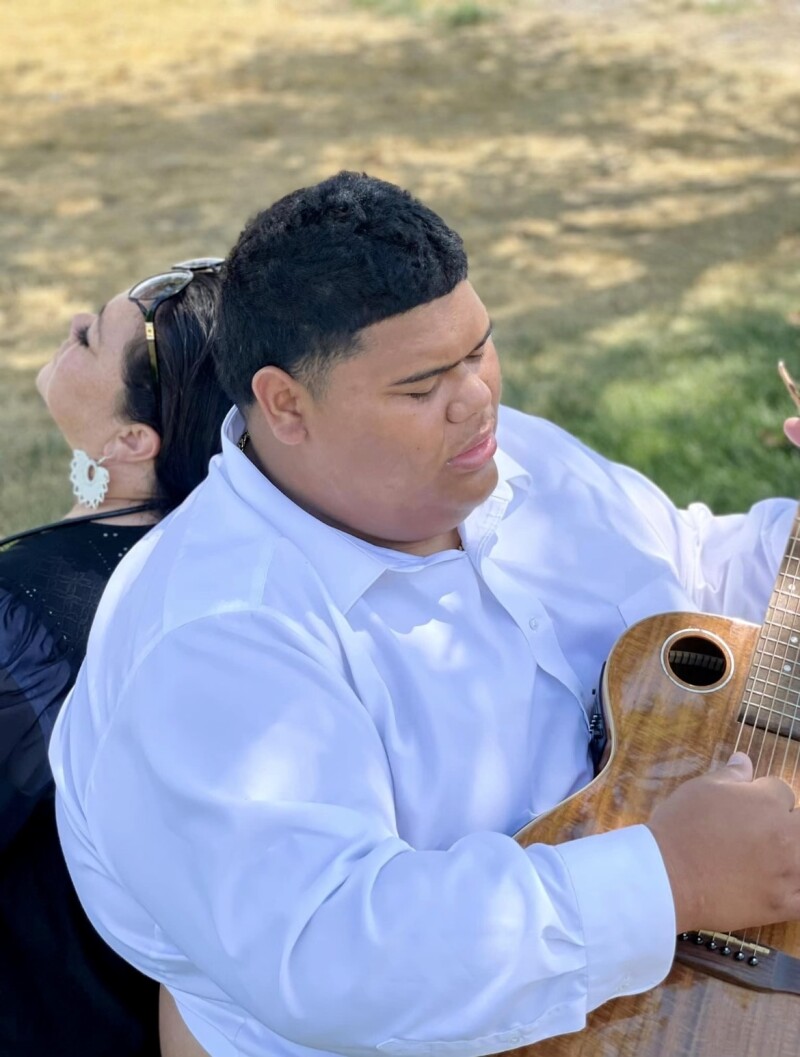
Lillie also helped her son through his sorrow; when Iam stopped playing music after his dad died, she signed him up to try out for American Idol. On top of losing his dad, though, Iam was discouraged from when he’d previously tried out for the show and hadn’t made it. So at first, he didn’t want to audition. But Lillie reminded Iam of what it would mean to his father.
“I told him, ‘Dad put so much work into your music. Dad had so much faith in you and what you could do. Wouldn’t you want to do it for Dad?’” she recalls. “And so that changed for him, and he was like, ‘Yeah, I’ll do it for Dad.’”
So Iam picked up the guitar again and made it through the first rounds of the competition before singing in front of judges Katy Perry, Luke Bryan, and Lionel Richie on TV. For that televised audition, Iam sang “Monsters” by James Blunt. His dad had died just a couple of months earlier, and lyrics like “And while you’re sleeping I’ll try to make you proud / So, Daddy, won’t you just close your eyes?” deeply touched not only the judges but many listeners: his audition has over 23 million views, the most of any audition on American Idol’s YouTube channel.

Iam certainly did plenty to make his dad proud—but not just because he would ultimately be the first Pacific Islander to win the competition, take home a prize of $250,000, and have the opportunity to record a new single. Just as important was how Iam came into his own, not only as a musician but also as a person of courage and faith.
Putting God First
Growing up, Iam always had good examples in his family of what it meant to put God first. Whether it was his parents paying tithing when they were struggling to make ends meet, his dad serving as an ordinance worker in the Laie Hawaii Temple, or siblings serving missions, the gospel has been a priority for his family—and Iam is no exception. During the competition, he and his mom always tried their best to make time for spiritual things.
“Every night we tried to read scriptures, even though sometimes we came back at like 1:00 in the morning,” he says.
The way he prioritized his faith made him an example among his peers too. Lillie says a contestant once told her that “Iam always walks [on] the bus and he’ll [start singing], ‘We belong to The Church of’ . . . then we just all laugh and some of us sing along,’” she says, referring to the Primary song “The Church of Jesus Christ.”
Iam also posted a clip on Instagram of President Russell M. Nelson in general conference saying “The best is yet to come,” a phrase that has also been used on American Idol. Lillie says some of the reactions he received from social media followers regarding the Church were negative, and Iam debated whether to take it down. But in the end, he decided to stay true to himself and kept it up.
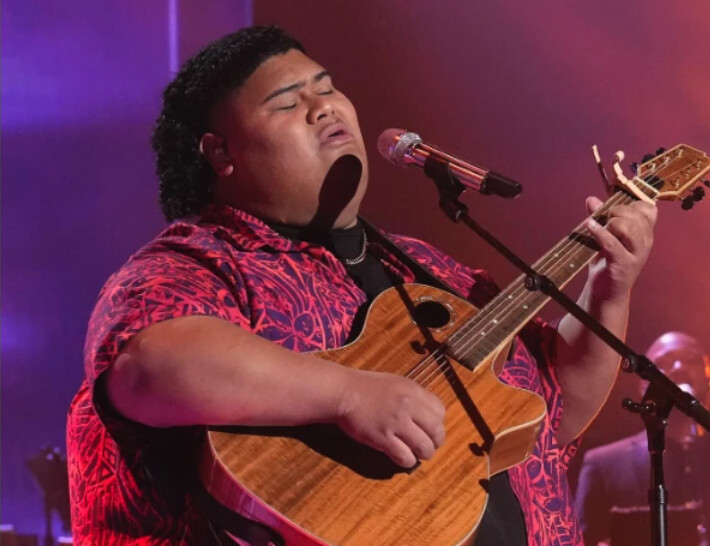
His courage was appreciated, and many of his followers left words of encouragement on the post. One fan, Bianca Beck, commented, “Thank you for sharing this! Put God first and everything will fall into place. I have so much respect for you, and I am hoping you win American Idol.” But even when he receives unkind comments, Iam says he always responds by saying things like “I love you” or by leaving an emoji of the shaka—a Hawaiian sign for “hang loose.”
Another post on Iam’s Instagram page shows him and several other Latter-day Saint American Idol contestants singing “I Need Thee Every Hour” when they met together in a hotel room one Sunday during the competition. Keeping the Sabbath day holy is important to Iam; after winning American Idol, he was scheduled to sing in Hawaii on a Sunday, so he asked if he could perform on a different day instead. Arrangements were then made so Iam could sing on a Saturday.
Iam also hopes to serve a mission in the near future. “I feel like that’s the main thing that my dad would want, is for me to go on a mission,” he says. “Winning American Idol is crazy—I think he’d be really proud. But I feel like I’ve got to go on my mission and continue to make him proud—even prouder.”
Staying True
While his testimony in the gospel is strong today, Iam says he’s questioned before how he could know for sure whether the Church is true. But after his dad passed away, Iam says, “I knew for a fact. That’s when I knew that there was no denying it, and I had to stand up for the Church and just stay true.”

Iam’s conviction of the gospel has come in part because of his testimony of eternal families—which at times has been confirmed to him in his dreams.
“I had a dream a couple of days ago, and my dad visited in my dream,” he says. “And he was young—he looked like how he did when he was on [his] mission. And I saw him there and then gave him a hug and said ‘I love you’ and ‘I miss you.’ And right then I knew that families are forever.”
So while father and son are separated for a time, Iam holds on to his faith that they will be together again one day. And though the distance between them may seem far, they remain close in spirit—just as he does with his Father in Heaven, who has also been with him in every step of his journey.
“If it wasn’t for my father and Heavenly Father, then I wouldn’t be here in this competition,” Iam says. “When I follow Christ, then it always works out. I can’t deny it.”
▶ You may also like: The scripture that inspired the Osmonds to share the gospel—even with Elvis and the Queen

